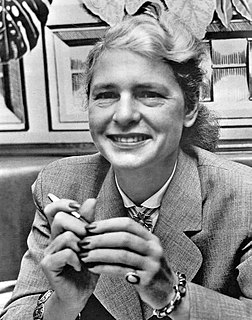A Quote by Margaret Bourke-White
Related Quotes
War is an ugly thing, but not the ugliest of things: the decayed and degraded state of moral and patriotic feeling which thinks nothing worth a war, is worse. A war to protect other human beings against tyrannical injustice; a war to give victory to their own ideas of right and good, and which is their own war, carried on for an honest purpose by their own free choice - is often the means of their regeneration.
In the old fairy tales, often a 'moral' was tacked on at the end of the story - say, if a book was going to be marketed to young readers. And the morals don't really suit the stories at all, which makes them super weird - part of why I love the tradition so much. I do play with this, though I am more concerned with ethics than morals.
We are in a war of a peculiar nature. It is not with an ordinary community, which is hostile or friendly as passion or as interest may veer about: not with a state which makes war through wantonness, and abandons it through lassitude. We are at war with a system, which by its essence, is inimical to all other governments, and which makes peace or war, as peace and war may best contribute to their subversion. It is with an armed doctrine that we are at war. It has, by its essence, a faction of opinion, and of interest, and of enthusiasm, in every country.
You have not been mistaken in supposing my views and feeling to be in favor of the abolition of war. Of my dispos[i]tion to maintain peace until its condition shall be made less tolerable than that of war itself, the world has had proofs, and more, perhaps, than it has approved. I hope it is practicable, by improving the mind and morals of society, to lessen the dispos[i]tion to war; but of its abolition I despair.
[F]or avoiding the extremes of despotism or anarchy . . . the only ground of hope must be on the morals of the people. I believe that religion is the only solid base of morals and that morals are the only possible support of free governments. [T]herefore education should teach the precepts of religion and the duties of man towards God.
Many a man renounces morals, but with great difficulty the conception, 'morality.' Morality is the 'idea' of morals, their intellectual power, their power over the conscience; on the other hand, morals are too material to rule the mind, and do not fetter an 'intellectual' man, a so-called independent, a 'freethinker.'



































